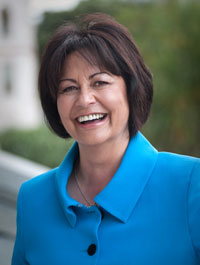In early April the Minister of Education, the Honourable Hekia Parata replied to a Open Letter sent to her the month earlier. After thanking the Secular Education Network for the letter she begins by stating that “A fundamental aspect of New Zealand’s education system is the governance of schools by Boards of Trustees that set policies and procecdures for school management, in consultation with their communities. This includes policies and decisions around religious instruction and observation.”
School Boards do have powers to manage their respective schools, however this does not permit Schools to violate the human rights of their students. This was made clear in the Open Letter which stated “It’s not good enough for the Government to endorse religion by proxy, through School Boards, only to step back and wash their hands of any responsibility for the resulting harms. We wish to be able to send our children to school secure in the knowledge that they will not be discriminated against on the basis of religion.”
Parata continues to say that the Government has no plans to change the sections of the Education Act that allows religious discrimination in New Zealand state primary schools, and reiterates the current state of the legislation.
Although the Open Letter made it clear that there were issues with schools not providing students with informed consent the Minister said “Parents and students are able to ‘opt out’ of religious instruction at anytime and schools should provide appropriate supervision and instruction for these students as part of their duty of care.” She continued to say that “It is expected that schools should communicate to parents that religious instruction is conducted at the school, whether it is Bible in Schools or another religious programme, so that parents and whanau can choose to include or remove their children from the programme.”
It is unclear how schools should be aware that they should seek permission from parents when the law does not require it and the Ministry of Education refuse to provide guidance in this regard. The Minister appears to ignore the facts on the ground as stated in the Open Letter which stated “There is no legal requirement to notify parents or seek their permission. There are young children, families, and teachers that are being denied their right to freedom of belief. They are being denied their right to hold their views privately, without this coming into conflict with sending their children to (or working at) their local state school. They are being denied their right to non-discriminatory treatment by their local state school.”
Parata continues to say that “The purpose of making schools Crown Entities, governed by Boards of Trustees elected from the school community, is so the schools values, principles and preferences are reflective of those held in the school community.” It appears therefore that the power of the School Board extends to deciding what religious beliefs students should have. Parata does not say if this power should also extend to allowing the School Boards to decide which political parties should be endorsed and have access to children.
Parata ends the letter by referring to the report on religion in New Zealand schools written by the Human Rights Commission in 2009, in which she says gives guidance on how schools “can give a place to religion that ensures security and dignity for students, teachers and communities.” This was a rather insulting conclusion givenhow the Open Letter describes how children are being treated: “There are the kids at small rural schools, marginalised and with nowhere else to go. Young children are given detention like activities every day around the country in our state schools for the crime of not conforming to the religious view that their school’s Board of Trustees has chosen for them. There are teachers getting bullied and harassed for not conforming to the religious majority at their place of work.”
Full Text of Open Letter:
State School Boards of Trustees have the power to authorise religious indoctrination in New Zealand primary schools. Our research shows over forty percent of state primary schools run religious instruction programs. Section 78 of the Education Act allows Boards of Trustees to invite religious instructors into classrooms to undertake whatever religious instruction they deem fit. No supervision, no vetting of material, no Ministry of Education involvement is required. Thousands of children are being removed from class and excluded on the basis of religion. There is no legal requirement to notify parents or seek their permission. It is our position that this is inconsistent with the Human Rights Act and therefore we seek the repeal of Section 78 of the Education Act.
This impact on children is demonstrably harmful. Religion is nothing if not legendary for sparking conflict. It is a very personal choice. A secular Government ensures that government agencies such as a state schools do not become a battleground for opposing ideologies or a place where there is tyranny by the majority. That is why our education system was specified as secular in the Education Act 1877.
Outcomes vary, from parents quietly gritting their teeth while sending their children to school, knowing that their child is going to be proselytised to; to religious harassment of young children, exclusion from school activities, and families forced to move schools to escape the spiral of discrimination. All because the family has chosen to opt their child out. Do we really want this to continue?
It doesn’t stop there. There are the kids at small rural schools, marginalised and with nowhere else to go. Young children are given detentionlike activities every day around the country in our state schools for the crime of not conforming to the religious view that their school’s Board of Trustees has chosen for them. There are teachers getting bullied and harassed for not conforming to the religious majority at their place of work.
There are young children, families, and teachers that are being denied their right to freedom of belief. They are being denied their right to hold their views privately, without this coming into conflict with sending their children to (or working at) their local state school. They are being denied their right to non-discriminatory treatment by their local state school.
The staggering thing about all this is that it is happening here at all. We have no state religion. New Zealanders consider themselves pretty progressive. We should not be forced or coerced into observing religion any more than we expect to be forced to support a particular political party. If the government cannot tell you what to think and believe, then neither should Boards of Trustees as administrators of a public institution. Why is there any less onus on Boards of Trustees to be neutral than on the Ministry of Education when they are running a state school?
It’s not good enough for the Government to endorse religion by proxy, through School Boards, only to step back and wash their hands of any responsibility for the resulting harms.
We wish to be able to send our children to school secure in the knowledge that they will not be discriminated against on the basis of religion. We the undersigned call on our Members of Parliament to repeal Section 78 of the Education Act 1964 and stop systematic discrimination in New Zealand primary schools.
Full Text of Ministers Reply:
Thanks you for your email of 8 March 2014 on behalf of the Secular Education Network about religious instruction in schools.
A fundamental aspect of New Zealand’s education system is the governance of schools by Boards of Trustees that set policies and procecdures for school management, in consultation with their communities. This includes policies and decisions around religious instruction and observation.
The Government currently has no plans to change the sections of the Education Act 1964 relating to religious instruction in New Zealand state primary schools.
Section 78 of the Education Act 1964 allows state primary schools to close for religious instruction under the condition that this does not exceed 60 minutes in any week and 20 hours in any school year.
Section 79 of the Act states student participation in religious instruction must be voluntary. Parents and students are able to ‘opt out’ of religious instruction at anytime and schools should provide appropriate supervision and instruction for these students as part of their duty of care.
Any religious instruction at a school should reflect the school community’s preferences and values. It is expected that schools should communicate to parents that religious instruction is conducted at the school, whether it is Bible in Schools or another religious programme, so that parents and whanau can choose to include or remove their children from the programme.
Schools are requires to consult with their school community and are expected to inform the community of what is happening at the school. The purpose of making schools Crown Entities, governed by Boards of Trustees elected from the school community, is so the schools’s values, principles and preferences are reflective of those held in the school community.
In 2009, the Human Rights Commission published a report on religion in New Zealand schools which provides guidamce on how schools can give a place to religion that ensures security and dignity for students, teachers and communities.

